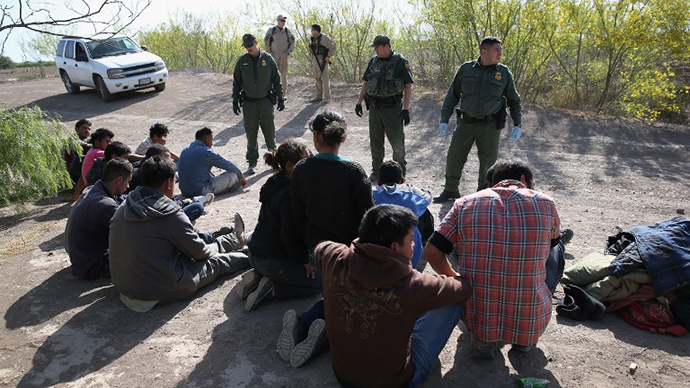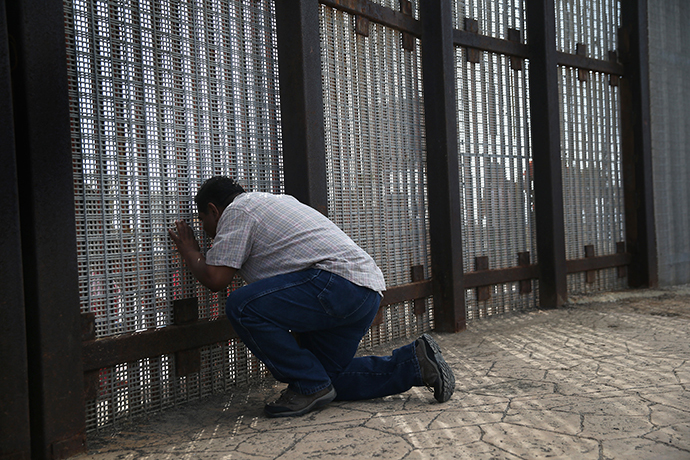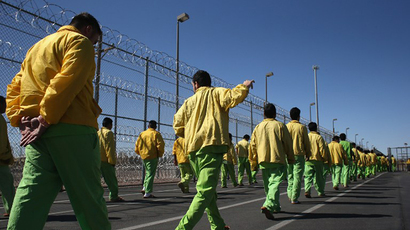Number of Mexicans crossing US border lowest in decades

Even as immigration remains a dominant political issue in Washington, particularly the issue of providing a pathway to citizenship for undocumented immigrants, the amount of Mexicans crossing the US border has come to a virtual standstill.
An estimated 12 million people are thought to have entered the US from Mexico over the past four decades, both by legal and illegal methods. Yet according to a recent survey by the Pew Hispanic Center, an arm of the Pew Research Center, the weakened US economy and tougher border enforcement are among the factors that have contributed to the sudden drop.
The downturn began around 2006 just as an immigration crackdown was ramping up and two years before the housing market crash that would push the US economy into a recession. Roughly seven million unauthorized immigrants were living in the US in 2007, but that number decreased by approximately 900,000 four years later, according to the Pew Research Center.
While the downturn is expected to end as the US economy continues to recover, the issue has taken center stage as remittances from Mexicans in the US to their families back home remain historically low. Meanwhile, remittances from the US to other Spanish-speaking countries in Latin America have generally recovered from an approximately two-year low during the recession, with nearly every country except Mexico returning to their pre-2008 numbers.
A Pew report based on data provided by the World Bank indicates
that US residents are responsible for 98 percent of the payments
sent to Mexico. Many of the industries that were hit hardest by
the recession are also the ones that happen to rely on Mexican
labor, most notably construction.

Still, remittances to Mexico in 2013 are still expected to near $22 billion. The money is one of the key factors contributing to economic growth in Mexico’s economy, even more so than the tourism industry and direct investment from foreign entities.
At the same time, unemployment among Mexicans in the US is falling, with workers moving between industries as some –construction, for example – continue to falter.
Remittances could also be falling simply because Mexicans don’t need the money quite as badly; the nation’s gross domestic product has grown substantially since 2006.
A growing number of Mexicans also may be unwilling to endure the hardship that comes with setting up a new life on the other side of the border. Deportations have increased under US President Obama. Conservative groups have advocated imposing new restrictions on immigrant communities and opposed federal legislation known as the Dream Act, which seeks to normalize the status of undocumented immigrants brought to the US as children.
Though some form of comprehensive immigration reform has wide voter approval among both Democrats and Republicans, and has gone forward in the Senate, any legislation seems to be dead in the water. House Speaker John Boehner stated as recently as last week that the legislative body would not be taking up the issue this year.
Another contentious idea that has gained traction in conservative politics, which generally sees immigration reform more as an issue of border security and prosecution of the undocumented, is known as “self-deportation.” Such policies come at a time when racism against Mexicans remains an issue in the United States.
The Young Conservatives of the University of Texas in Austin, for example, are taking heat for organizing an event called “Catch an Illegal Immigrant.” The students promise to reward participants with a $25 gift card each time they “catch” another student wearing an “illegal immigrant” pin.
Event organizers told reporters the game is meant to “spark a conversation” about “how much [immigrants] put into the system and how much they take.”















